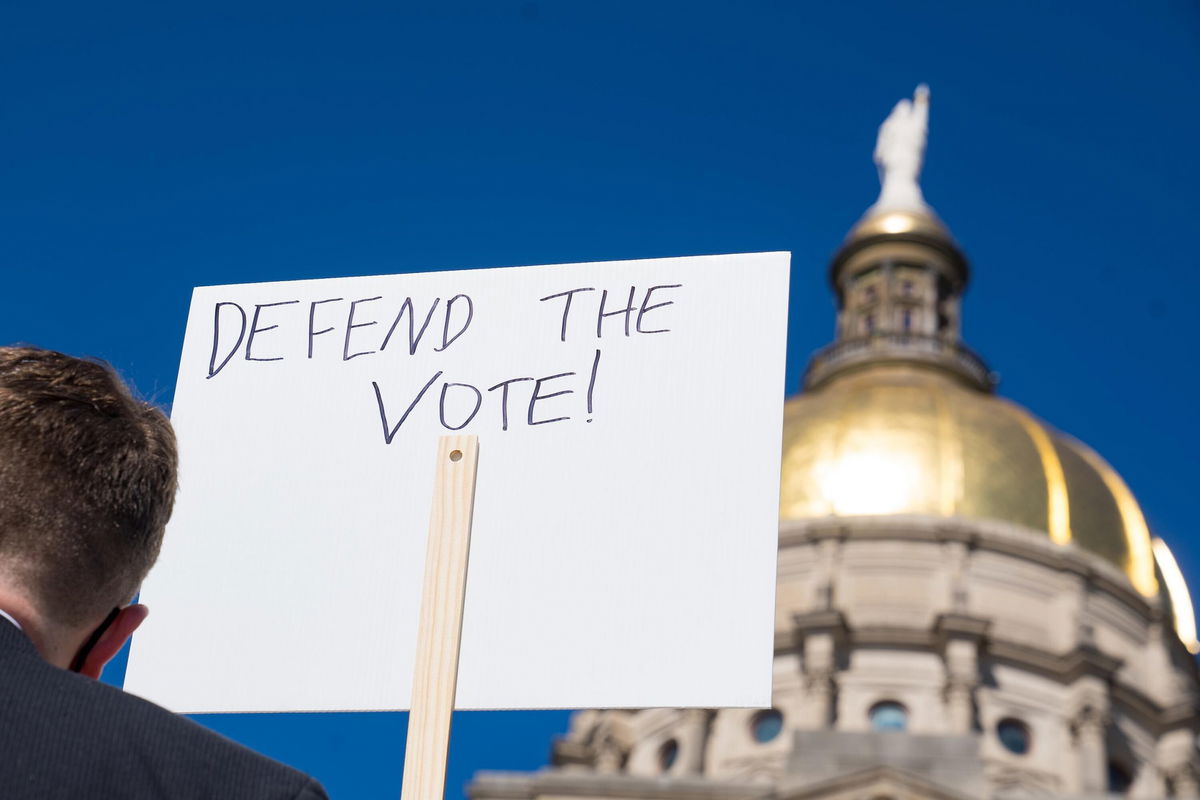Garland announces DOJ lawsuit against Georgia over voting restrictions

By Devan Cole, Christina Carrega, Fredreka Schouten and Evan Perez, CNN
The Justice Department is suing Georgia over new voting restrictions enacted as part of Republican efforts nationwide to limit voting access in the wake of President Donald Trump’s election defeat.
The state law imposes new voter identification requirements for absentee ballots, empowers state officials to take over local elections boards, limits the use of ballot drop boxes and makes it a crime to approach voters in line to give them food and water.
Republicans had cast the measure as necessary to boost confidence in elections after the 2020 election and Trump’s repeated and unsubstantiated claims of fraud, but Democrats in the state have called the new law voter suppression and likened it to Jim Crow-era voting laws.
RELATED: Trump is doing more lying about the election than talking about any other subject
The lawsuit, coming days after Senate Republicans sunk their Democratic counterparts’ signature voting and election bill during a key test vote, represents an early example of the Biden administration attempting to use the levers of government to try to block restrictive state laws
“This lawsuit filed is the first of many steps we are taking to ensure that all eligible voters can cast a vote that all lawful votes are counted and that every voter has access to accurate information,” Attorney General Merrick Garland said at a news conference Friday.
Civil Rights Division leader Kristen Clarke said the Georgia law is aimed at Black and minority voters.
“These legislative actions occurred at a time when the Black population in Georgia continues to steadily increase and after a historic election that saw record voter turnout across the state, particularly for absentee voting, which Black voters are now more likely to use than White voters,” Clarke said during the news conference. “Our complaint challenges several provisions of SB 202 on the grounds that they were adopted with the intent to deny or a bridge, Black citizens, equal access to the political process.”
Following the Georgia law’s passage, President Joe Biden called on Congress to pass voting rights legislation that would counter measures like it.
The President at the time called the Georgia law “Jim Crow in the 21st Century” and “an atrocity.”
More action from DOJ to come, including on audits
Also Friday, the Justice Department announced a task force to address the rise in threats against election officials. Jurisdictions across the country, especially with high-stake local elections like in Fulton County, Georgia, reported receiving threats and racist taunts.
Garland said that the Justice Department will decide to file more federal civil lawsuits against states that have passed restrictive voting laws.
“We’re looking at laws that were passed before, as well as the ones that have been recently passed, and as they are being passed, and we’ll make the same kind of judgment that we made with respect to this one,” Garland said.
This year alone, 14 states have passed controversial voting rights laws that Garland flagged.
“Some jurisdictions, based on disinformation, have utilized abnormal post-election audit methodologies that may put the integrity of the voting process at risk and undermine public confidence in our democracy,” the attorney general said.
Georgia law challenged in multiple lawsuits
Georgia became the first presidential battleground this year to pass new voting restrictions in the wake of Biden’s White House victory — setting off legal battles and prompting rebukes from major corporations in the state. Major League Baseball pulled the All-Star Game out of Georgia in protest.
Before the Justice Department’s action Friday, at least seven lawsuits already had been filed, challenging its provisions.
Shortly after it was passed in March, the law had already been challenged in court by a trio of voting rights groups: the New Georgia Project, the Black Voters Matter Fund and Rise Inc. The lawsuit said the new law “disproportionately impacts Black voters, and interacts with these vestiges of discrimination in Georgia to deny Black voters (an) equal opportunity to participate in the political process and/or elect a candidate of their choice.”
Opponents of Georgia’s law applauded the DOJ’s move, with NAACP President Derrick Johnson saying it “speaks to the level of urgency that is needed to protect our fragile democracy and ensure that all voices are heard.”
State government
Voting rights activists have voiced particular alarm at parts of the law that give the Republican-controlled state government new powers over how elections are run in the state’s Democratic strongholds.
Under the law’s provisions, the Republican-controlled legislature now has the power to select three out of five members of the state elections board. And that board has new powers to replace local election officials it deems as poorly performing. The board now can take over election administration in up to four counties at a time.
Additionally, lawmakers removed the secretary of state as a voting member of the state elections board. The current Secretary of State, Republican Brad Raffensperger, resisted former Trump’s false claims of election fraud in 2020 and now faces a primary challenge from a strong ally of the former president, GOP Rep. Jody Hice.
This story is breaking and will be updated.
The-CNN-Wire
™ & © 2021 Cable News Network, Inc., a WarnerMedia Company. All rights reserved.